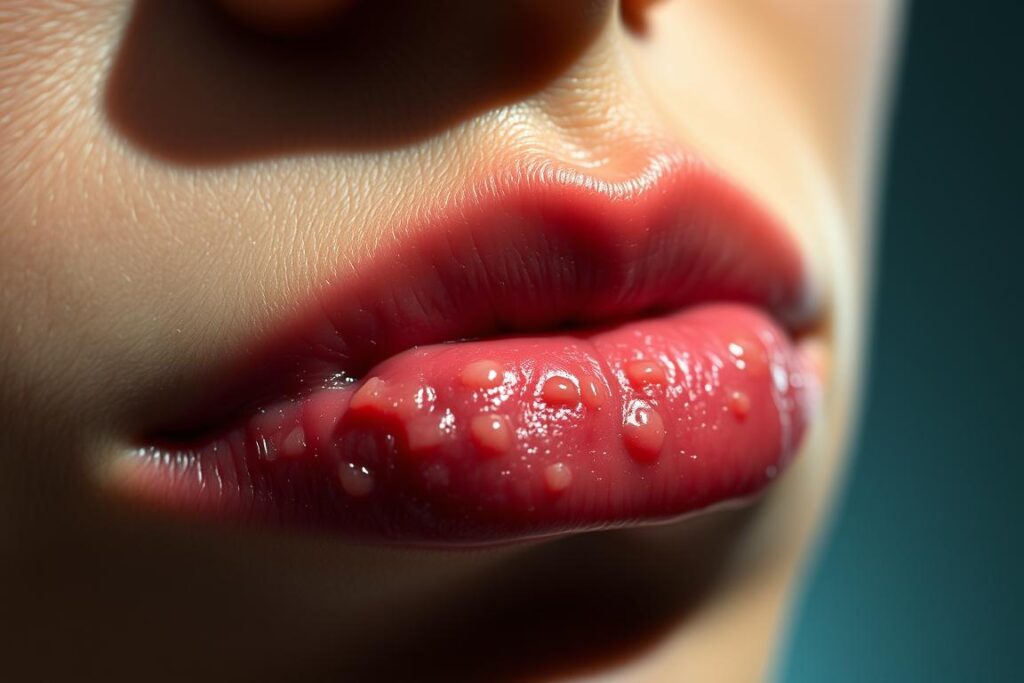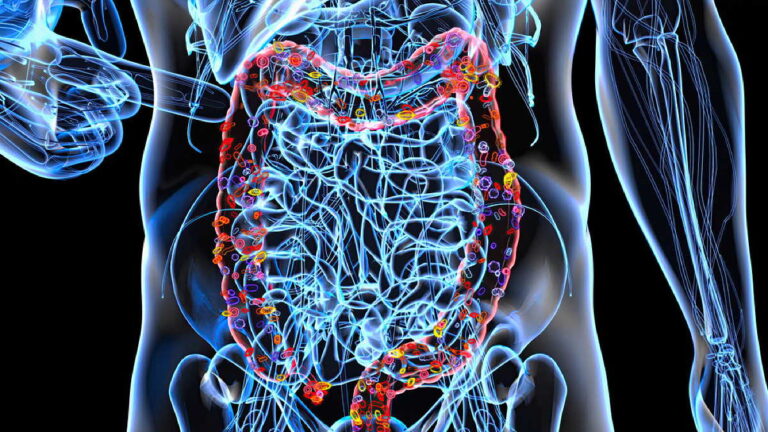What helps against herpes? Home remedies and medicine
Herpes is a widespread viral disease characterized by painful blisters on the lips or in the genital area. Around 80 percent of adults carry the herpes virus.
The infection cannot be permanently removed from the body, but the symptoms can be treated effectively. There are various home remedies and medical treatments that can help alleviate symptoms and reduce outbreaks.
Proven natural remedies such as honey, tea tree oil and lemon balm as well as antiviral creams and tablets are effective options against herpes.
Understanding herpes: Causes and spread
Most people come into contact with herpes viruses in the course of their lives. Herpes viruses are a group of viruses that can cause various diseases.
What are herpes viruses and how are they transmitted?
Herpes viruses are ubiquitous and can be transmitted through close contact with infected persons. The infection often goes unnoticed, especially in childhood.
Transmission can occur through direct contact with infected body fluids or skin lesions.
| Transmission paths | Description |
|---|---|
| Direct contact | Transmission through direct contact with infected body fluids or skin lesions |
| Indirect contact | Transmission through contaminated objects or surfaces |
Spread of herpes in Germany
In Germany, around 90 percent of adults are infected with the herpes simplex virus. Around 80 percent of adults carry the herpes virus, although many show no symptoms.
Around 30 percent of virus carriers develop cold sores, while five to ten percent suffer from them more than five times a year.
The high spread rate is explained by the easy transmissibility of the virus and the fact that many infected people show no symptoms.
Typical symptoms and course of a herpes infection
Herpes infections manifest themselves through characteristic symptoms that range from initial infection to reactivation. Most people who are infected with herpes viruses do not show symptoms immediately, as the viruses often remain in a dormant state.

First infection: How to recognize a herpes outbreak
When first infected with herpes viruses, symptoms can vary. Some people do not notice any signs at all, while others suffer from flu-like symptoms such as fever and swollen lymph nodes. The initial infection can also be accompanied by local symptoms such as pain, itching or burning at the infected site.
After the initial infection, the herpes viruses remain in the nerve nodes of the body for life and can be reactivated if the immune system is weakened.
Reactivation: Why herpes can keep coming back
Reactivation of the herpes viruses occurs when the immune system is weakened. This can be caused by various factors such as stress, other infectious diseases or certain medications. During reactivation, those affected often feel a characteristic tingling or burning sensation in the affected area before the typical blisters appear.
Other triggers for reactivation can be hormonal fluctuations, strong sunlight and minor injuries to the lips. People with frequent reactivations should therefore pay attention to their lifestyle habits and try to minimize the known triggers.
What helps against herpes? Proven home remedies at a glance
There are various home remedies that can help in the treatment of herpes, and some of them have been scientifically confirmed. These natural helpers can be a good alternative or supplement to medical treatments.
Honey and propolis as natural helpers
Honey and propolis are known for their antibacterial and antiviral properties. They can help to alleviate the symptoms of herpes and speed up healing. Some studies suggest that honey can inhibit viral activity.
Tea tree oil: application and effectiveness
Tea tree oil is another home remedy that is used in the treatment of herpes. It has antiviral properties and can help fight the viruses. However, it is important to use tea tree oil carefully and not to apply it to open areas of skin.
Lemon balm: The scientifically confirmed household remedy
Lemon balm is an herb that is traditionally used to treat herpes. Studies have shown that it can alleviate symptoms and promote healing. Lemon balm can be applied in the form of creams or ointments.
Other effective home remedies for herpes
There are many other substances that are considered herpes home remedies. Some people swear by aloe vera, garlic, black tea or ginger. Although their effectiveness is less scientifically proven, many sufferers report positive experiences.
- Aloe vera can help to soothe the skin and promote healing.
- Garlic has antiviral properties that can be effective against herpes viruses.
- Black tea can alleviate the symptoms due to its astringent effect.
- Ginger has anti-inflammatory properties that can help in the treatment of herpes.
However, it is important to consult a doctor or pharmacist before using home remedies, as some remedies can be harmful if used incorrectly. When applying home remedies, you should pay attention to hygiene by using cotton buds and washing your hands thoroughly.
Cooling the affected area can be useful in the early stages of a herpes outbreak, as it makes it more difficult for the virus to multiply. Zinc ointment can also help to alleviate the symptoms due to its drying and disinfecting effect.
Medical treatment options for herpes
Effective treatment of herpes is crucial to alleviate symptoms and avoid complications. In severe cases or frequently recurring outbreaks, systemic treatment with antiviral medication may be necessary.
Antiviral creams and ointments
Various antiviral creams and ointments are available for the local treatment of herpes. These products contain active ingredients such as acyclovir or penciclovir, which inhibit the replication of the virus and thus promote healing.
They can be applied directly to the affected areas of skin and are generally well tolerated.
Systemic treatment with tablets and infusions
In cases where the herpes infection is severe or affects certain areas of the body such as the eyes, systemic treatment may be necessary. Antiviral tablets such as acyclovir, valaciclovir or famciclovir are used to inhibit viral replication throughout the body.
- In severe cases, frequently recurring outbreaks or if certain areas of the body such as the eyes are affected, systemic treatment with antiviral medication may be necessary.
- Antiviral tablets are prescribed by a doctor and taken over several days.
- In particularly severe cases, for example in patients with a weakened immune system, antiviral medication is administered as an infusion in hospital.
- For patients who suffer from frequently recurring herpes, there is the option of long-term prophylaxis with low-dose antiviral medication, which is available on prescription from pharmacies.
This preventive treatment can significantly reduce the frequency and severity of outbreaks and thus minimize the symptoms and restrictions in everyday life.
Preventing herpes: how to avoid outbreaks
The risk of a herpes outbreak can be minimized by observing certain lifestyle factors and hygiene measures. An important aspect of this is to keep the body strong in order to support the immune system.
Lifestyle factors for prevention
A healthy lifestyle can help to reduce the risk of a herpes outbreak. This includes getting enough sleep, eating a balanced diet and avoiding stress. A strong immune system can reduce the frequency and severity of herpes outbreaks.
Hygiene measures to prevent infection
To prevent the herpes virus from spreading to other parts of the body or other people, certain hygiene measures must be observed. These include
- Avoiding direct contact with the herpes blisters to prevent transmission.
- Not sharing objects such as cutlery, glasses, towels or washcloths during an outbreak.
- Wash your hands thoroughly after contact with the blisters.
- The use of cotton buds when applying medication or household remedies and their disposal after a single use.
By following these tips and minimizing contact with the blisters, the spread of the virus can be reduced. It is also advisable to refrain from kissing and sharing personal items during an active outbreak to minimize contact with the virus.
When to see a doctor? Special risk situations with herpes
Herpes can lead to serious complications in certain situations, which is why it is important to see a doctor in good time. Certain groups of people are particularly at risk if they contract herpes.
Alarm signals that require medical attention
If herpes causes symptoms such as severe pain, fever or a deterioration in general health, a doctor should be consulted immediately. A herpes infection can be particularly serious in people with a weakened immune system.
Herpes during pregnancy and in newborns
A herpes infection during pregnancy poses a particular risk, as the virus can be transmitted to the unborn child. In the case of an initial infection with genital herpes during pregnancy, the risk of transmission to the child is around 30 to 50 percent.
| Risk situation | Measure |
|---|---|
| Genital herpes during pregnancy | Caesarean section in the last weeks of pregnancy |
| Active cold sores on contact with newborns | Wear a face mask, clean your hands, avoid kissing |
| First infection with genital herpes during pregnancy | Medical monitoring and antiviral treatment if necessary |
It is important that people with active cold sores avoid any close contact with newborn babies. The risk of infection can be minimized by wearing a face mask, washing hands carefully and avoiding kissing.
Herpes on unusual parts of the body
Herpes can also affect other parts of the body besides the lips. Although herpes blisters predominantly occur on the lips, they can also rarely occur on other parts of the body. These include, among others: Nose, eyes, fingernails, nipples and buttocks.
Transmission to these unusual parts of the body usually occurs through self-inoculation, i.e. by touching an active herpes and then touching other parts of the body. This can lead to various symptoms and complications, depending on the part of the body affected.
Genital herpes: symptoms and treatment
Genital herpes is one of the most common sexually transmitted diseases. Symptoms can include itching, burning and pain in the genital area. In some cases, the symptoms can be mild, while in others they can be severe.
The treatment of genital herpes usually includes antiviral medication, which can alleviate the symptoms and shorten the duration of the disease.
| Symptoms | Treatment |
|---|---|
| Itching and burning | Antiviral creams |
| Pain in the genital area | Antiviral tablets |
Herpes in the eye and other parts of the body
Herpes in the eye, also known as herpes keratitis, can be caused by the transmission of viruses from the lips to the eyes. If left untreated, this can lead to corneal inflammation and permanent visual impairment.
Other unusual locations for herpes are the nose, fingernails (herpetic whitlow), nipples and buttocks. The symptoms are similar to typical herpes blisters, but often cannot be immediately recognized as herpes due to the unusual location.
It is important to consult a doctor if you have herpes in the eye area or other unusual areas of the body, as special treatment approaches may be required.
Living with herpes: Long-term strategies and dealing with recurrent infections (113 words)
Although herpes viruses remain in the body for life after the initial infection, there are ways to reduce the frequency and severity of outbreaks. Around 80 percent of adults carry the herpes virus, but individual differences in the immune system determine who suffers from regular outbreaks of cold sores.
This article has presented various approaches, from home remedies such as honey and lemon balm to medical treatments that can inhibit the replication of the viruses. With the right knowledge and consistent prevention, most people with herpes can lead a normal life and significantly reduce the frequency and severity of outbreaks.






